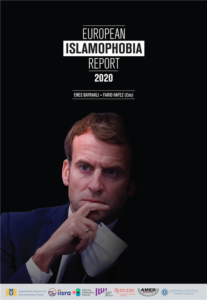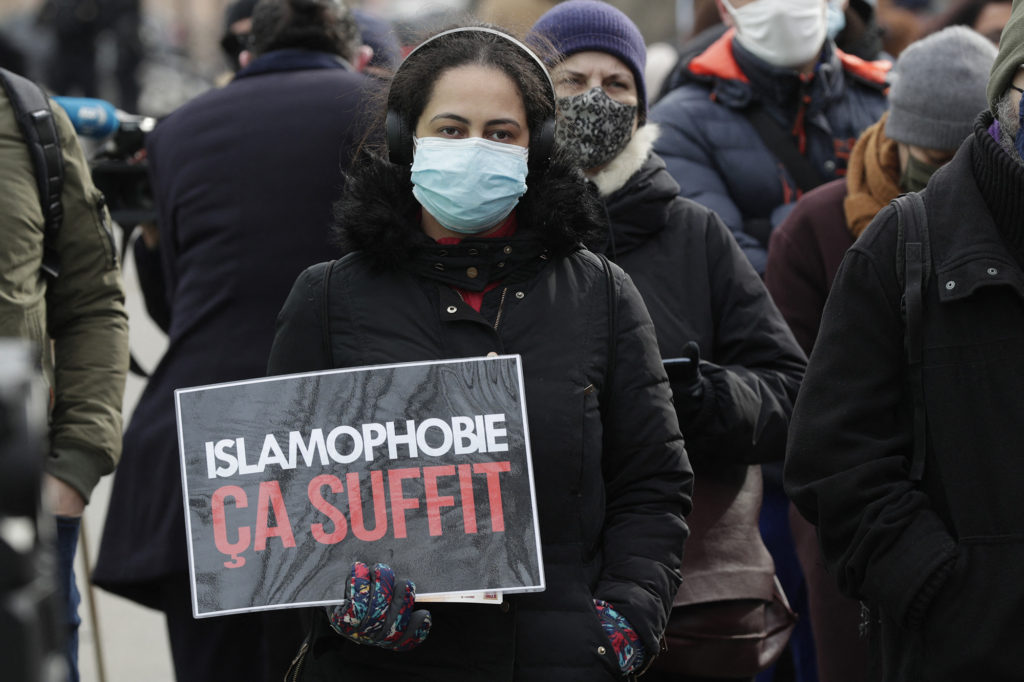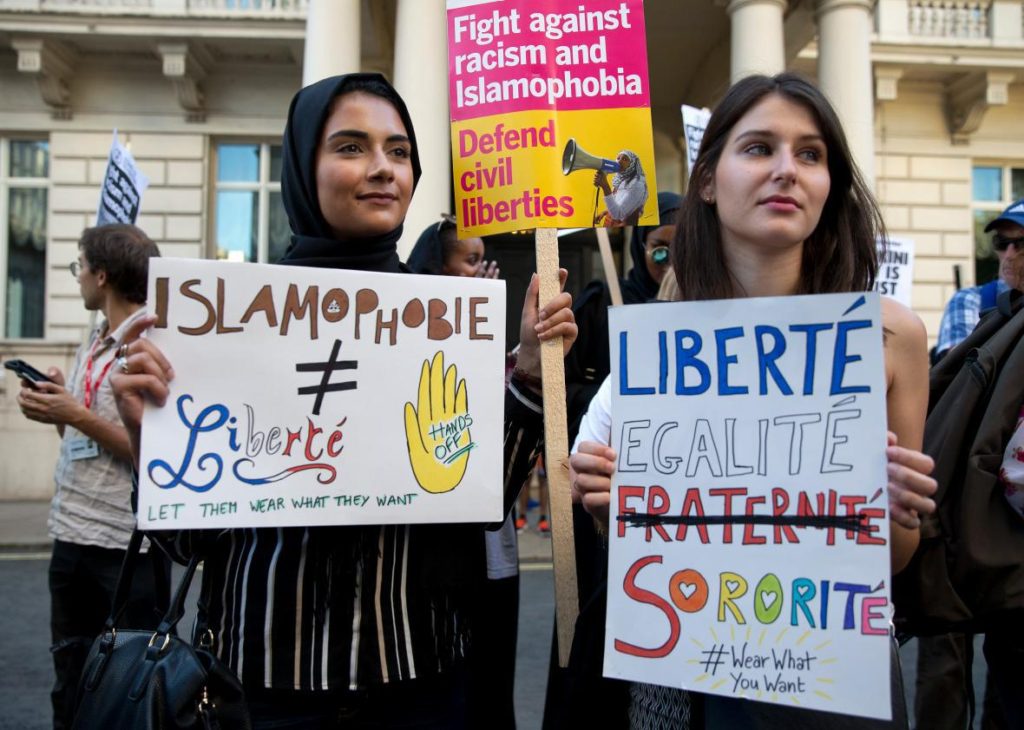On April 24, 2022, Emmanuel Macron was re-elected president of the French Republic, defeating Marine Le Pen in the second round of the presidential election. While there is much to celebrate in the non-election of the far-right candidate, there are several reasons to be concerned with this result.
 Since 2015 and the terrible attacks against Charlie Hebdo’s siege, and the attacks committed on November 13th in Paris, the fight against terrorism in France has resulted in an unprecedented crackdown on Muslims and Islamic expressions in France, reaching its paroxysm under Emmanuel Macron’s first term in office. It was not surprising, in fact, that Emmanuel Macron was on the cover of the European Islamophobia Report 2020.
Since 2015 and the terrible attacks against Charlie Hebdo’s siege, and the attacks committed on November 13th in Paris, the fight against terrorism in France has resulted in an unprecedented crackdown on Muslims and Islamic expressions in France, reaching its paroxysm under Emmanuel Macron’s first term in office. It was not surprising, in fact, that Emmanuel Macron was on the cover of the European Islamophobia Report 2020.
A direct attack on spirituality
Although structural and popular Islamophobia in France is rooted in the particularities of its history (its colonial past, its unique vision of secularism, its universalism and its assimilationist approach to minorities[1]…), its expression has intensified these last five years, through a constant criminalization of Islam and the Muslim population.
The relevance that the argument of a Islamic “separatism” has gained in recent years is very worrying and suggests the worst for the years to come. These arguments have been supported by various think tanks (in particular the Institut Montaigne) or consulting firms linked to the Macron government, which have elaborated an argument that justifies the existence of a real threat to the French “republican” values, which distances itself from the country’s expected values of Equality, Fraternity and Liberty.
One of the most worrying points of this new policy is the identification of spirituality as a factor responsible for radicalism, “separatism” and terrorism. Although radicalism is a real problem, its social dimension has been supressed in favour of a simplistic and culturalist logic that caters only to spiritual components.
As part of an effort to reduce religion to its internal expression, and thus to the private sphere, Macron’s government has developed a narrative that criminalizes external, “usual” practices or expressions of religion, such as prayer.
To illustrate this policy, it suffices to recall the words of former Interior Minister Christophe Castaner, who in October 2019 explained before a commission of inquiry that growing a beard, having the “tabaâ“[2] and thus praying rigorously or devoting more attention to religion during the month of Ramadan were “weak signals” and harbingers of “radicalization”[3].
This logic is part of a “continuist” theory brought to light by the ministers of the Macron era. A view that suggests that religious activity inevitably leads to extremism and thus to jihadism. A theory which, despite having been refuted and invalidated by numerous international researchers, remains the thesis of the ruling elite and the intellectuals of the television sets.
As denounced in a tribune, or, rather, in an open letter signed by more than thirty academics and researchers and published on the website of the “Collectif Contre l’Islamophobie en Europe (CCIE)”, through this policy, Macron intends to set himself up as a “Grand Mufti” of French Islam, defining what may or may not be the Islamic doctrine.
Vulnerability of human rights under the Macron era
However, Macron’s project has not stopped at the elaboration of a new rhetoric aimed at directly influencing the spirituality of millions of French people, it also acts directly on the population through its institutionalization.
This institutionalization of the control of Islam and Muslims includes the promulgation of the Law to reinforce respect for the principles of the Republic[4], known as the Law against “Islamic separatism”, which set in motion a whole series of mechanisms aimed at creating a “republican Islam of France”.
The law, promulgated on August 24, 2021, was widely debated and was appealed before the Constitutional Council for endangering – among other things – freedom of association. All associations receiving public subsidies are now bound by a “republican engagement contract”, a term as vague as it is dangerous, unilaterally defined by the executive. In addition to its liberticidal character, this law is also the symbol of a security frenzy and an obsession with Islam sadly reminiscent of McCarthyism.

Gerald Darmanin, Minister of the Interior, Jean Castex, Prime Minister and Eric Jalon, prefect of Essonne, during a meeting of the departmental unit for the fight against Islamism, in the prefecture of Essonne, December 09, 2020. Photo: Alamy
In this context, the Minister of the Interior, G. Darmanin, justified the dissolution of the association “Coordination contre le racisme et l’islamophobie” (Coordination against racism and Islamophobia), by affirming that Islamophobia exists in French society. As expressed in the decree published to this effect on October 20, 2021: “it works actively, in particular through social networks, to cultivate the suspicion of Islamophobia in French society”[5].
Another control mechanism is found in the elaboration of the “Charter of the Principles of Islam in France”[6]. as well as with the creation of a governing body of Muslim culture in the hands of the executive, called “Forum of Islam in France (FORIF)”[7], under the control of the Ministry of the Interior. under the control of the Ministry of the Interior.
A defence based on the criminalization of criticism
Most worrying, however, has been the criminalization of criticism. Criticism of Macron’s policies has been numerous, and international NGOs, such as Amnesty International and Human Rights Watch, have produced many reports describing and denouncing the authoritarian and discriminatory excesses carried out by the government. However, these reports have been quickly discredited, under the argument of the Islamist threat or the need to respect secularism.
Thus, today in France it seems complicated to speak openly and freely of “State racism” or “institutional Islamophobia” without running the risk of being labelled and accused of inciting hatred of France and promoting separatism, what is now called an “Islamo-leftist” (Islamogauchism).
Last year, in fact, a list of personalities qualified as Islamo-leftist, gathering more than a hundred politicians, activists or researchers, was published on an extreme right-wing website, Fdesouche. A list which included the personal data of some people.
Début août, je découvrait l’existence d’un fichier très suspect provenant du site de « Fdesouche »
C’est un tableau Excel qui établit une liste de ethnique et politique, de ce que l’extrême droite considère comme les « islamogauchiste » des centaines de personnes sont fichées ; pic.twitter.com/ddSwSyVP74
— Taha Bouhafs 🔻 (@T_Bouhafs) September 16, 2021
These disturbing practices are also, and above all, the result of the policy of the Macron government. As France Insoumise MP Clémentine Autain points out:
“when Blanquer [Minister of Education] and Vidal [Minister of Higher Education and Research] go to war against the “ravages of Islamogauchism”, they are helping to legitimize this type of data collection. These fascist methods must be fought as such.” [8]
These two ministers have prompted an aggressive media campaign, which reuses the rhetoric of the extreme right by evoking a form of “gangrene” or “fifth column” in universities. This opposition between academics, anti-racist activists and the government is also an opposition between scientific approaches and studies of social phenomena against demagogic political discourses and arguments.
This campaign has been extended to the private sphere through the Law reinforcing internal security and fight against terrorism (SILT), which came into force on November 1, 2017 to replace the state of emergency, and which has greatly facilitated the implementation of surveillance and intrusion into the personal lives of many people.
As part of the fight against terrorism, this law made it possible to transfer to the Ministry of the Interior powers hitherto reserved to the judiciary. Many of the special provisions of this exceptional regime have been incorporated directly into ordinary law. In particular, house arrest, administrative searches (now subject to the authorization of a judicial judge) or the closure of places of worship are prerogatives of the Interior applicable on “serious grounds for believing that the conduct constitutes a threat to public order”.
An intolerable situation?
The balance of the last legislature does not bode well for his newly renewed mandate. The entrenchment of a repressive and authoritarian administration seems to have become normalized and could even inspire other European countries after this French leadership.
These policies have resulted, not only in increased control of Islam and Muslim communities in France, but also, as a recent New York Times article noted, in a growing brain drain of French Muslims abroad. This article, based on research conducted by researchers from the National Center for Scientific Research at the University of Lille, the University of Liège and KU Leuven in Belgium and the University of Amsterdam, highlighted how discrimination has often been a major factor for leaving the country, as well as the existence of a glass ceiling, or the constant reference to a “non-belonging to the French identity”.
Tristan Semiond – FUNCI
References
[1] It should be recalled, for example, that France has always refused to implement Article 27 of the International Covenant on Civil and Political Rights or to ratify the Framework Convention for the Protection of National Minorities.
[2] Mark on the forehead formed by regular rubbing of the head on the prayer rug.
[3] Hearing of Christophe Castaner by the Law Commission, October 8, 2019. http://videos.assemblee-nationale.fr/vod.php?media=8204226_5d9ca9d57c415&name=%22Commission+of+laws+%203A+M.+Christophe+Castaner%2C+Minister+of+the+E2%80%99Int%C3%A9rieur%22+of+October+8+2019
[4] Loi confortant le respect des principes de la République dite loi contre “le séparatisme islamiste”.
[5] Original text : : “elle œuvre activement, en particulier par l’intermédiaire des réseaux sociaux, à cultiver le soupçon d’islamophobie au sein de la société française” Décret du 20 octobre 2021 portant dissolution d’une association, JORF n°0246 du 21 octobre 2021 Texte n° 64.
[6] Charte des principes de l’islam de France.
[7] Forum de l’islam de France.
[8] Fabien Leboucq. “Que sait-on de cette liste de personnalités «islamogauchistes» hébergée par Fdesouche ?”, Libération, 17/09/2021. [En linea] https://www.liberation.fr/checknews/que-sait-on-de-cette-liste-de-personnalites-de-gauche-hebergee-par-un-site-dextreme-droite-20210917_FTMFIQ3JUFDFXIQLFTL2J4DWXE/

















No Comments